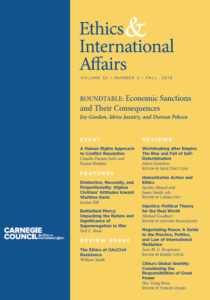Apartment building in Dnipro, Ukraine after Russian missile attack on January 14, 2023. Photo credit: Dnipropetrovsk Regional State Administration via Wikimedia Commons
Editor’s note: A version of this response appeared in German on January 17, 2023 in Frankfurter Allgemeine Zeitung.
On December 28, 2022, Reinhard Merkel wrote in the Frankfurter Allgemeine Zeitung that the government in Kiev has a duty to “accept ex bello negotiations and end their unqualified rejection.” His argument invokes a doctrine of just war theory, jus ex bello, which I have played a prominent role in developing. As I understand it, jus ex bello is the set of considerations that should guide our thinking about two questions: First, whether a war may be permissibly continued or must be ended; and second, if it should be ended, how that morally should be done. Merkel’s position seems to be that in answer to the first question, Ukraine is obliged to enter into concessionary negotiations to seek an end to the war. I fundamentally disagree with Merkel’s moral judgment, and I reject the political implications that it has.
In his essay, Merkel correctly distinguishes Ukraine’s right to self-defense under international law from the moral question of whether it should continue its defensive war against Russian aggression. He also correctly condemns the injustice of the Russian invasion. Jus ex bello, however, is particularly significant when developments within a war give compelling reason to believe that the just cause of the war can no longer be realized, or at least not within the bounds of morality. It can sometimes then be difficult to accept the conclusions of jus ex bello, especially when a just cause to continue fighting remains. Arguably this was the case when the United States pulled out of Afghanistan in 2021. However, Merkel does not provide a convincing argument that Ukraine, a country suffering war crimes at the hands of another that is seeking to impose colonial rule, should make concessions for the sake of peace. On the contrary, there are good reasons to believe that any such argument is implausible in present circumstances.
The Foundations of Jus ex Bello
Jus ex bello—the justice of ending war—shares some of the formal features of jus ad bellum, which establishes when entering into war is morally permissible. In both cases, the aim is to limit the justified use of military means. The theory of the just war, to which both jus ex bello and jus ad bellum belong, differs from pacifism in that it permits some wars in principle. The theory has sometimes been accused of being a collection of excuses for war. However, this is to mistake the basic logic of just war theory. Just war theory assumes that wars are unjust unless they meet a number of conditions, even if there are profound disagreements among just war theorists about what these conditions are and whether and how exactly they apply to a particular case.
Just war theorists generally agree, however, that war is permissible only if it is a response to a grave injustice. Though opinions may differ as to what exactly constitutes a “just cause,” it is widely agreed that a just cause alone cannot justify a war. There may be morally less costly ways—diplomatic means, for example—to achieve justice. And even when this is not the case, the costs that a party must impose in military pursuit of a just cause may be too high, or the chance of success too low. These considerations are referred to as “necessity,” “proportionality,” and “reasonable likelihood of success.”
As a matter of jus ad bellum a war must not be started unless there is a just cause, it is necessary to achieve justice, its moral costs are proportionate to the realization of the cause, and the chances of success are reasonable. In my view of jus ex bello, the same general conditions apply when the issue is whether or not to continue a war that was just to initiate. The war may be continued only if there are no diplomatic means for achieving justice, the wrongs the war involves have not been and will not be excessive in comparison to the end pursued, and the prospects for achieving the end remain reasonably good.
As far as I can tell Merkel does not disagree with me on the importance of just cause, necessity, proportionality, and the chances of success. An advantage of agreement on such a moral framework is that one can focus on specific points of contention. While Merkel and I agree that Ukraine has a just cause to resist Russian aggression, we disagree about whether the war is proportional because we disagree about how proportionality is to be understood.
A Warped Conception of Proportionality
The idea of proportionality states that there is an equilibrium point between the justice a war champions and the costs it imposes. A pursuit of justice that requires imposing costs beyond this equilibrium point would be wrong even if victory were possible: there is no good that may be pursued at all costs. How to understand what the equilibrium point is and how it is justified are ongoing discussions in just war theory.
Be that as it may, Professor Merkel’s proportionality argument errs in its attribution of the costs of the war. He seems to hold the erroneous view that if the overall moral costs of the war would be predictably massive—regardless of which side imposes them—then Ukraine is obliged, as a matter of proportionality, to end the war. However, this view does not differentiate between costs that a side imposes and the costs that it suffers in pursuit of a defensive war. Such a view would hold Ukraine obligated to end the war because of Russia’s war crimes.
Since the political stakes are high, moral clarity is especially important. Let me explain in more detail where Merkel’s judgment goes wrong. Merkel claims correctly that Ukraine cannot deny responsibility for the deaths in the Polish village of Przewodów if Ukraine errantly caused them in an effort to protect itself from a Russian attack. Accidental deaths are typically counted under proportionality because they are costs imposed by a warring party, even if not intended. Amazingly, however, the case of Przewodów is the only concrete example of Ukrainian cost-imposition that Merkel cites to support the claim of the excessive cost of the country’s defensive war.
Compared to the death toll and massive misery caused by Russia’s terror campaign of targeting the civilian population and public infrastructure, the Ukrainian military has been remarkably restrained. But as Merkel sees it, “In the end, Ukraine may be able to win this war, politically and perhaps also militarily, but at best with a record of destruction that no longer gives any comprehensible meaning to the concept of such a victory.” Counting the large number of Russian crimes as a reason against Ukraine’s defensive war amounts to victim blaming. On Merkel’s view, it is not those who caused the misery who are held to account, but those who suffer it.
Merkel anticipates the victim blaming charge, but his dodge fails to convince. He insists that Ukraine bears responsibility for the destructiveness of the war, even though Russia is the culprit: “Governments have a duty to protect the citizens of their countries. This also includes defending the state against aggressors, but also protecting the life and limb and future of its citizens.” Protection of citizens is indeed a duty of governments, but to count the crimes of the aggressor against the morality of defense is completely contrary to the idea of proportionality, which limits the imposition of costs. Any defensive struggle can result in the aggressor mistreating and murdering the citizens of the defending state. To count these misdeeds against the justice of defense would result in defensive wars quickly becoming disproportional. More concerningly, this view would provide the invader with a perverse incentive to wreak enough havoc that the defending party is compelled to negotiate, no matter how unjust the cause.
It would be a different matter if the citizens of Ukraine demanded that their government start negotiations to end the conflict. In this counterfactual situation, Merkel’s assertion that the Ukrainian government has a duty to negotiate a concessionary end could appeal to the dwindling confidence in the legitimacy of the war. However, there is no evidence in the current reporting that many Ukrainians actually hold such views. The extent to which one can trust polling data from a country under heavy attack might be questioned, but the Gallop poll conducted in September of 2022 indicated that 70 percent of Ukrainians favored fighting till victory. Assuming the credibility of the data, it is untenable to claim on grounds of legitimacy that the Ukrainian government owes it to its citizens to immediately seek a negotiated solution is untenable.
The Continued Justice of Ukraine’s Fight
Professor Merkel’s claims to the contrary notwithstanding, the justice of Ukraine’s continued fight comes down to four considerations taken together. First, the cause of repulsing the Russian effort at domination is just. Second, there is no effective means for doing so other than militarily. Third, although the prospects for success are hard to gauge, it is important to bear in mind that from the beginning the capacity for Ukrainian success has been underestimated. Finally, as long as one does not falsely attribute the wrongs of the unjust Russian aggression to Ukraine, its defensive efforts are certainly proportional.
None of this is to argue that there will never come a time when negotiations would be a reasonable means by which to cease hostilities, but nothing about the application of jus ex bello to contemporary circumstances entails that Ukraine is obliged to seek a concessionary settlement. The only route to that conclusion is via moral misunderstanding.
Darrel Moellendorf is Professor of International Political Theory and Professor of Philosophy at Johann Wolfgang Universität Frankfurt am Main. He is also Distinguished Visiting Professor at the University of Johannesburg, a member of the research group Normative Orders at Goethe Universität, and a Goethe Fellow at the Forshcungskolleg Humanwissenschaften (Bad Homburg).
The post “Jus Ex Bello” and the Continued Justice of Ukraine’s Fight Against Russia appeared first on Ethics & International Affairs.
Source: Ethics and International Affairs



Be First to Comment